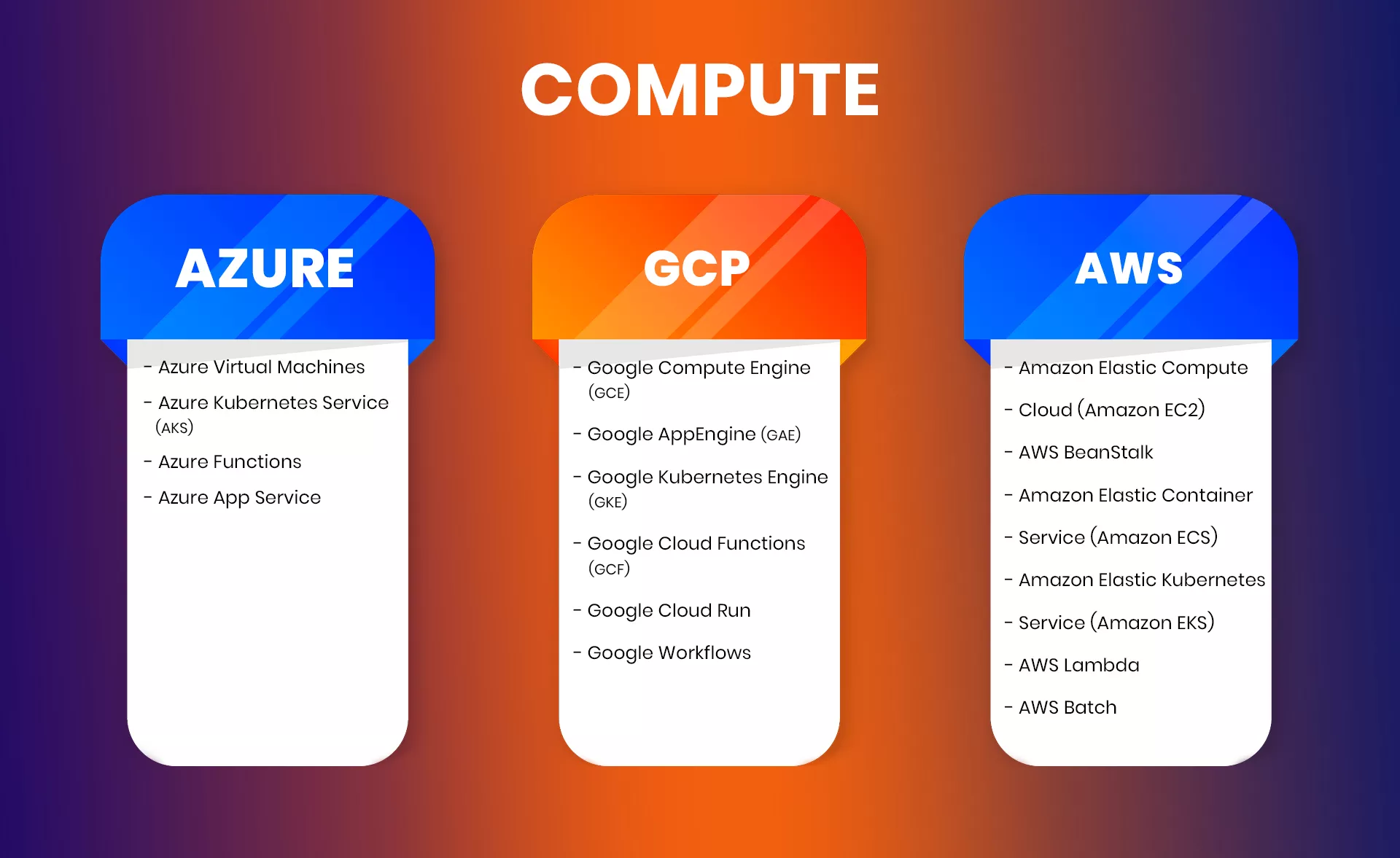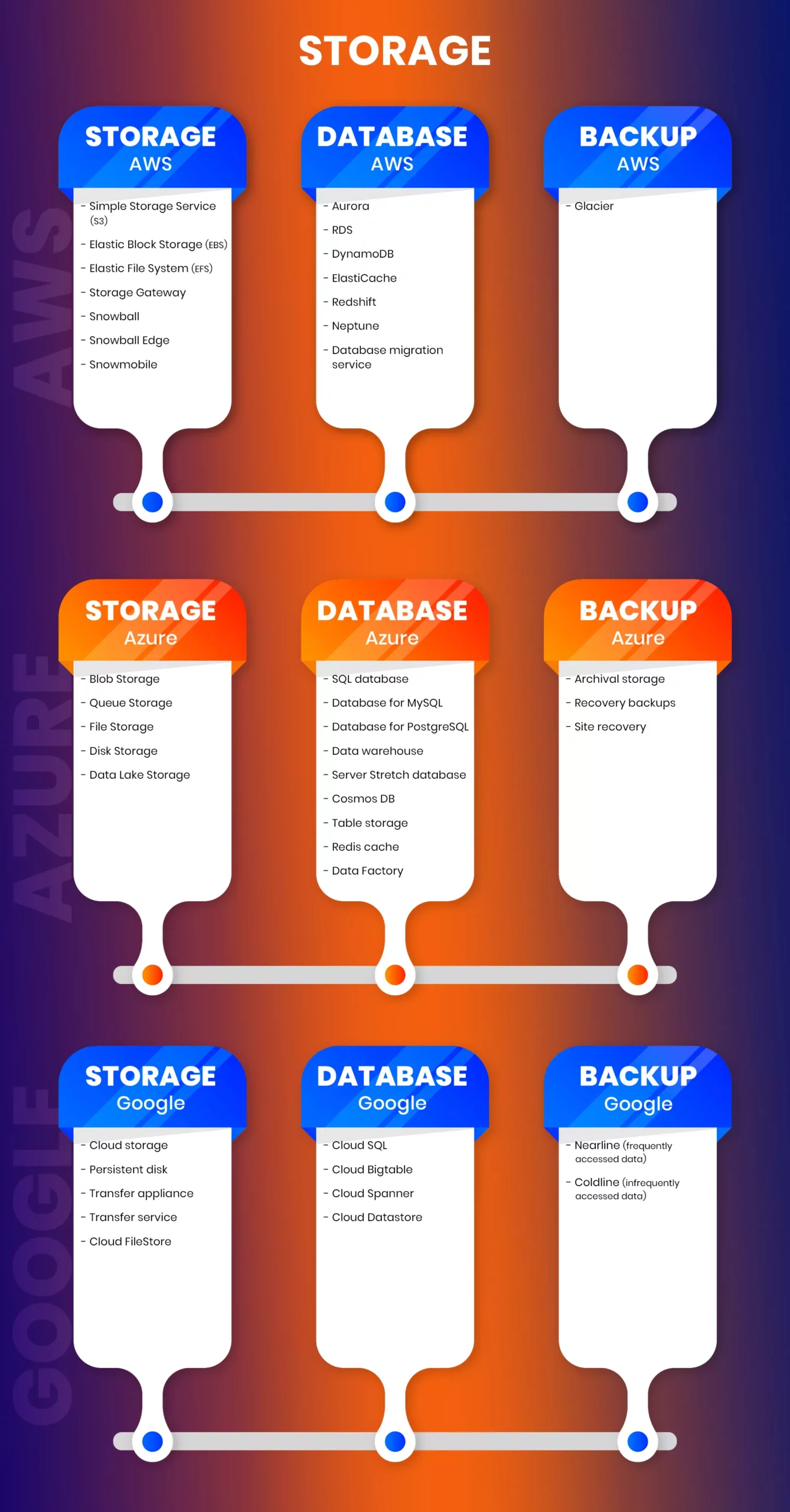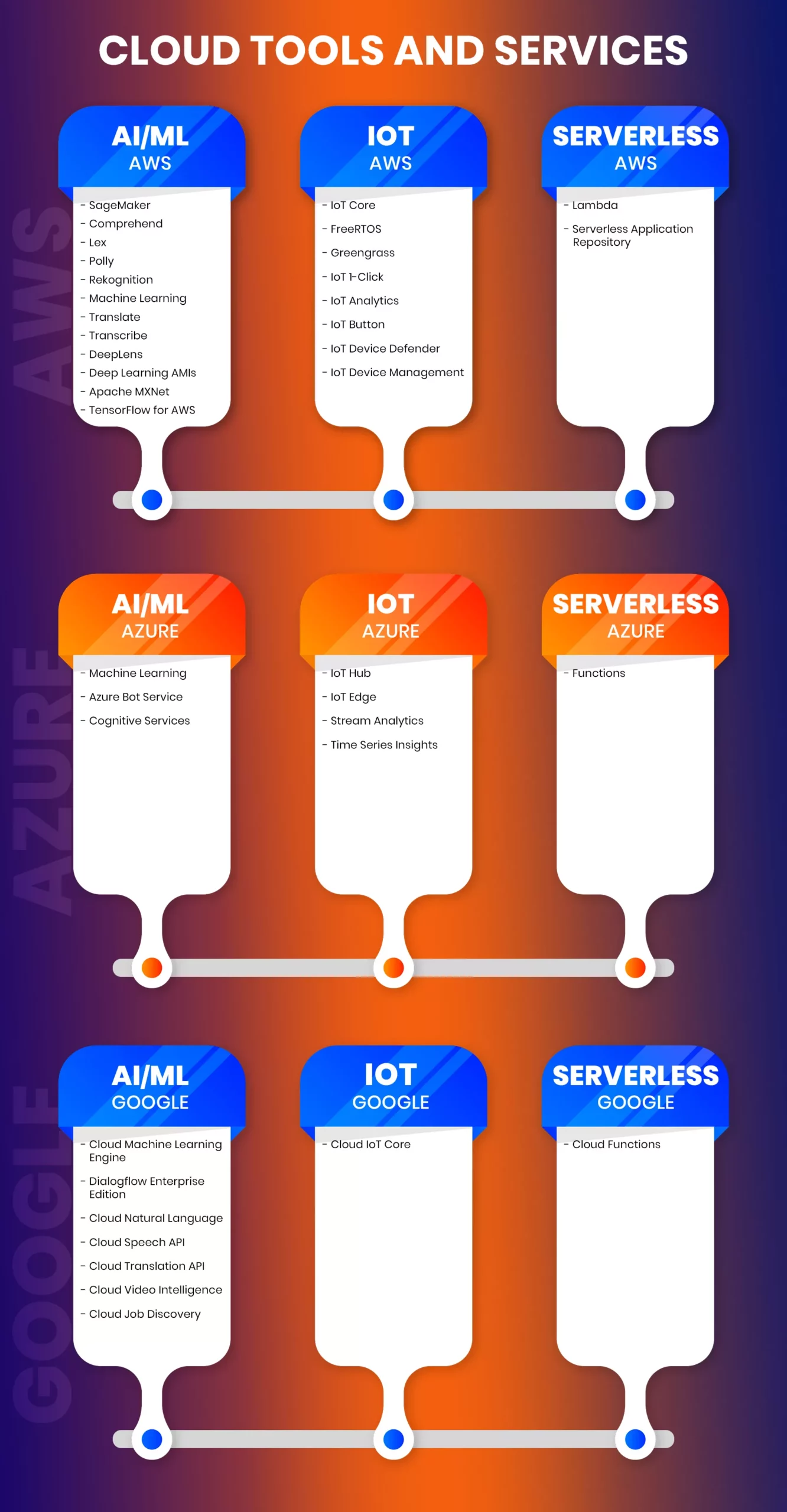Generating summary…
**This 2020 guide has been updated for 2021
When migrating from on-premises IT infrastructure to the cloud, one of the first questions businesses need to tackle is which cloud vendor to choose. For the most part, it’s not a simple decision. For instance, three global cloud vendors available in 2021: Google Cloud, AWS, and Microsoft Azure share a surprisingly large number of similarities. Furthermore, businesses will also take into consideration something called “vendor lock-in”. Once a business has migrated to a cloud, changing vendors will require another migration which costs additional time and money, albeit, less so than the original migration.
To help you figure which cloud service provider is the best for you, we’ve worked with our cloud-certified engineers and developers to create this in-depth guide that compares Google Cloud, AWS, and Microsoft Azure on the basis of 4 major factors: storage, compute, cloud tools and pricing.
Editor’s Note: D3V Tech is a Google Cloud Partner. However, this is a bias-free guide and we’ve looked at each cloud vendor objectively to help you make the best decision.
Overview: Google Cloud
Google offers other businesses to run their software on the same infrastructure as its own services such as Google Search, Mail, and Youtube – which is very confidence-inspiring, to say the least. Google Cloud or Google Cloud Platform (GCP) was launched just two years (2008) after the launch of Amazon Web Services (2006) and two years before Microsoft Azure (2010) but despite its early launch, Google Cloud has been able to corner the smallest market share (hence, why it’s called the underdog of the industry). As of now 2021, the top three cloud vendors had the following market share:
- AWS (63%)
- Azure (29%)
- GCP (8%).
However, it’s important to note that the lower market share isn’t a reflection of Google’s cloud services, rather a testament to the power of early bird advantage and Microsoft’s existing corporate clientele, almost all of whom choose Azure due to its integration capabilities with Microsoft tools (Office, Outlook, etc.) Another thing to note is that Google Cloud’s market share has been slowly increasing year-on-year.
Key Strengths
In a nutshell, why would a business choose Google Cloud over the other vendors? One of the things Google Cloud beats others at is pricing. Google Cloud has very aggressive pricing along with a large number of discounts that make it far, far more affordable than the other either AWS or Azure.
Google also has less experience in dealing directly with businesses and has always been a B2C company. But this is also an advantage. Google Cloud has done everything to make cloud services more approachable and easy to get started with. For instance, Google Cloud has made conventionally challenging technologies like Machine Learning and Artificial Intelligence extremely accessible with a wide range of innovative products in these fields. As a result, GCP is a more user-friendly option. It also promotes DevOps and agile development, open-source support, and multi-cloud. Google Cloud also has less of a vendor-lock with services like BigQuery Omni that analyzes your data even if it’s on different clouds, including AWS and Azure.
Overview: AWS
Amazon Web Services is undoubtedly the current king of cloud services, in terms of market share, at least. Thanks to the early bird advantage and the fact that it had more experience serving businesses cloud services than anyone else, AWS managed to secure a contract with the CIA to help improve collaboration and communication between the 17 intelligence agencies. However, is it still the best or has the competition caught up?
The truth is, AWS has developed a very strong product with a large collection of cloud services. It’s reliable, enterprise-friendly, and global in every sense of the word. In short, AWS is an easy recommendation for most businesses. However, this mature offering isn’t cheap. AWS will cost smaller businesses more than either Azure or GCP for the same services and some may find it less than ideal for smaller development teams.
Key Strengths
AWS is a mature, enterprise-ready cloud service provider with the largest network of data centres providing excellent global reach and performance. As a result, it’s often the obvious choice for larger businesses. It’s also been around for the longest time meaning it’s easier to find AWS-proficient developers and plenty of case studies for you to use during your cloud migration. AWS also has the largest cloud ecosystem with over 175 services that aid businesses across a variety of fields.
Overview: Microsoft Azure
Microsoft Azure launched relatively late but quickly amassed a large market share by leveraging its other products related to the Windows and Office line. It also gave discounts to entice existing customers to use Azure. Since then, Azure has integrated a large number of Microsoft services into Azure, automatically onboarding new customers.
Azure is an enterprise-ready cloud solution but has caught criticism in the past for lack of refinement. Many customers found that Azure wasn’t on the same level as other Microsoft products and even competing cloud vendors when it came to pricing, customer support, documentation, or services. However, Azure is quickly changing all of that and has also seen constant growth in the past few years (only AWS has been losing market share).
Key Strengths
Azure’s biggest strength is the seamless integration with the Windows ecosystem. For instance, since .Net framework is one of the on-premises software that is now on Azure, your existing .Net code can be used on Azure as well. Some other Microsoft services ported to Azure include Windows Server, Office, SQL Server, Sharepoint, and Dynamics Active Directory. Azure is also considered a safe alternative to AWS due to its global reach, a wide range of tools, and hybrid cloud capabilities.
Differences: Which cloud vendor does it best?
Compute
Each cloud vendor has separate compute services. In most cases, Amazon’s Elastic Compute Cloud or EC2 is considered the best overall. It has a wide variety of options and configurability.
Azure’s offering is called Virtual Machines and it is comparative to EC2 in most areas but it has fewer related services and versatility.
Google Compute or Compute Engine also offers a lot of customizability and sits between EC2 and Virtual Machines in terms of versatility as it has a large assortment of compute related services including the popular Kubernetes Engine.
Both AWS and Azure offer a free tier that offers 750 hours of compute per month for 12 hours while Compute Engine’s free tier allows one f1-micro instance per month for up to 12 months.

Storage
Once again, AWS is the most mature option here with a long list of storage and database options. Again, Azure is comparable to AWS in both storage and database options but actually offers more options when it comes to backup, and so does Google. Speaking of which, Google has the least number of storage and database options.

Cloud Tools and Services
Additional tools and services should be an important factor in your decision since a larger ecosystem of cloud services allow you to break free from third-party services and ensure all of your business needs can be fulfilled through one platform.
In terms of cloud tools, AWS has the largest ecosystem, Google has the second-largest ecosystem, and Azure has the least amount of additional cloud tools and services.

Pricing
AWS is undoubtedly the most mature cloud service provider in the market right now. However, this versatility also commands a high price. More importantly, though, AWS’ cloud services are highly intertwined and this makes the pricing structure more complex. But the general consensus is that AWS is one of the pricier options. To get more clarity on the actual cloud spend you can expect, we recommend using a third-party price calculator AWS as the in-built calculator isn’t very functional.
Since Azure is targeting a similar demographic as AWS (large enterprises), it also has a similar pricing structure, that is, it’s not very cost-effective for smaller operations. However, the free trial in both AWS and Azure is a good method to try their situational pricing before actually paying out of pocket.
As we previously mentioned, Google Cloud is more tailored towards startups and small-medium enterprises which means it is more affordable. It also offers deep discounts which, in most cases, makes Google Cloud the best option from a strictly cost perspective.
Wrapping up…
Vendor lock-in is a concern that can be put to rest with proper research and expert guidance. For instance, it’s easier to judge these vendors on the basis of pricing, app ecosystem, datacentres, and performance when you have your cloud requirements clear. This can be a challenge for a company that is still in the planning stage. If you are one such company, feel free to reach out to our certified cloud engineers for guidance on choosing the right cloud services provider and a complete cloud migration roadmap.
